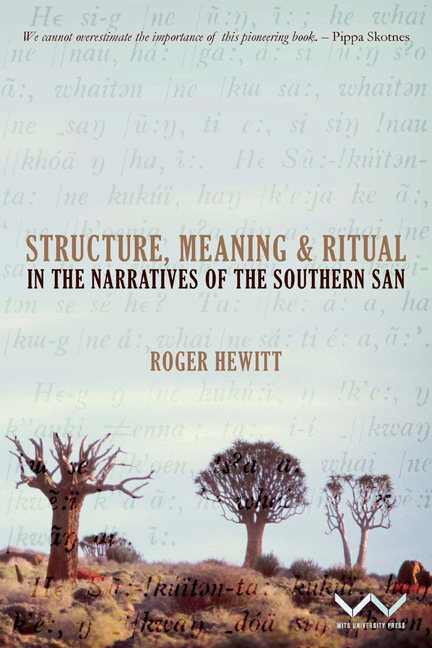Book contents
- Frontmatter
- Dedication
- Contents
- Acknowledgements
- Introduction
- 1 Ethnographic background
- 2 Introduction to the narratives: their context, performance and scope
- 3 Legends and the stories of !Khwa
- 4 Sidereal narratives: the story of the Dawn's Heart and his wife the Lynx
- 5 Animal narratives
- 6 |Kaggen in belief and ritual
- 7 The |Kaggen narratives (1): characters and content
- 8 The |Kaggen narratives (2): sequence and structure
- 9 |Kaggen in belief, ritual and narrative: a synthesis
- 10 Two |Kaggen narratives: compositional variations
- 11 The verbal surface: a note on the narrators
- Appendix A Girls’ puberty observances of the ǀXam
- Appendix B The shamans of the ǀXam
- Bibliography
- Index
6 - |Kaggen in belief and ritual
Published online by Cambridge University Press: 21 April 2018
- Frontmatter
- Dedication
- Contents
- Acknowledgements
- Introduction
- 1 Ethnographic background
- 2 Introduction to the narratives: their context, performance and scope
- 3 Legends and the stories of !Khwa
- 4 Sidereal narratives: the story of the Dawn's Heart and his wife the Lynx
- 5 Animal narratives
- 6 |Kaggen in belief and ritual
- 7 The |Kaggen narratives (1): characters and content
- 8 The |Kaggen narratives (2): sequence and structure
- 9 |Kaggen in belief, ritual and narrative: a synthesis
- 10 Two |Kaggen narratives: compositional variations
- 11 The verbal surface: a note on the narrators
- Appendix A Girls’ puberty observances of the ǀXam
- Appendix B The shamans of the ǀXam
- Bibliography
- Index
Summary
The largest group of narratives which deals with a single character or group of characters, is that concerned with ǀKaggen, the trickster, and his family. Twenty-one distinct narratives concerning ǀKaggen were collected, many of these in several versions. In addition to the narratives, a large number of statements concerning ǀKaggen were also recorded which show that his reality for the ǀXam was more than fictive, that, in fact, as a supernatural being, ǀKaggen was believed to participate actively in their lives.
The narratives themselves give an account of ǀKaggen's life set in the time when he and the other animals were people. He lived amongst men but was set apart notably by his marked anti-social behaviour. At the point at which, with the exception of the San, the inhabitants of this world were transformed into the animals they are today, ǀKaggen continued to live on as a supernatural being who could take many forms. Thus, for the ǀXam, there were two phases to ǀKaggen's life: one in the distant past, recorded in the narratives; the other in the present, as a supernatural being.
While it is now impossible to discover the extent to which the narratives were believed to be true accounts of ǀKaggen's life before the world became changed, the statements of belief about him do offer some indication of the relationship between his supernatural and his fictional natures. Indeed his early exploits were occasionally referred to by the informants as explanations for his actions in the present. Furthermore, the beliefs about him evince several implicit characteristics which were directly transformed into fictional terms in the narratives. Both aspects – fictional and supernatural – may, therefore, be seen to be, in some respects, different projections of a single conception.
As a supernatural being, ǀKaggen related principally to hunting and game, and the beliefs about him were situated in a context of beliefs about the relationship thought to exist between humans and animals. In Dorothea Bleek's (1929a: 309) words:
The whole world is very much alive to the Bushmen; the borderline between the powers of nature and animals is vague, that between animals and men more so.
A few examples of this relationship will serve as an introduction to the beliefs concerning ǀKaggen.
- Type
- Chapter
- Information
- Publisher: Wits University PressPrint publication year: 2008



